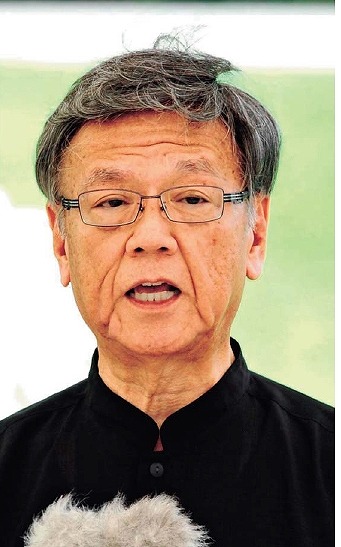Governor Onaga’s Peace Declaration (Full Text)

June 23, 2015 Ryukyu Shimpo
June 23 has come for the 70th time.
One of the most ferocious land battles in history occurred in our homeland of Okinawa. More than 200,000 precious lives were sacrificed. We will never be able to forget the sadness of losing our loved ones; our family and our friends.
We cannot forget because in Okinawa, we have the memory of the horrors war brings clearly etched in our eyes and ears, and on our skin. We cannot forget because we wish from our hearts for the peace of those who were lost in war, and we fervently hope for eternal peace.
Our strength helped us walk a path of reconstruction and development after the war without ever forgetting those wishes and hopes.
However, 73.8 percent of U.S. military exclusive use facilities in Japan, which uphold the U.S.-Japan security system, are located in Okinawa, which makes up only 0.6 percent of Japan’s land mass. This excessive burden of bases continues to impact the lives of Okinawans and Okinawa’s economic development in a multitude of ways. Even if the U.S. military bases south of Kadena Air Station are consolidated as part of the U.S. military realignment, beginning with the relocation of MCAS Futenma to Henoko, the proportion of U.S. military exclusive use facilities in Japan that are located in Okinawa will only be reduced by 0.7 percent The timeline for return of this land is also unclear. Therefore this plan far from amounts to a reduction of the base burden.
Okinawa’s U.S. military base issue is an issue of Japan’s national security, and it is a crucial issue that should be shouldered by Japanese citizens as a whole.
In particular, regarding the relocation of MCAS Futenma to Henoko, the will of the Okinawan people was made clear in last year’s elections. It will be extremely difficult to build a new military base in Henoko.
MCAS Futenma was built on land seized from Okinawans forcibly without our consent, and it has been called the most dangerous air base in the world. It would be unacceptable to keep it in operation permanently. Furthermore, the idea that it must be relocated to Henoko in order to eliminate the danger it poses, or that Okinawans must propose an alternative solution if we don’t like the current plan, is not something that the Okinawan people can accept.
It is impossible to build a cornerstone of peace if freedom, equality, human rights, and democracy are not guaranteed equally for all citizens.
I strongly hope that the Japanese government will decide to cancel all work pertaining to the relocation of MCAS Futenma to Henoko, and that it will rethink its policy to reduce the burden of bases on Okinawa without being held down by preconceived notions.
In the world today, many people are losing their lives and having their dignity trampled on, as a result of regional conflict, terrorism, discrimination and poverty. Such tragedies occur every day.
In order to face this reality and solve the problems that threaten peace, it is crucial that each and every one of us has a strong determination to proactively pursue peace.
In Okinawa, our forefathers acted as a bridge between the nations of Asia. As we approach 70 years since the end of World War II, we will inherit their embrace of all nations of the world and work to achieve development and peace in the Asia-Pacific region.
For the sake of our children and grandchildren who will inherit the future, we will create wealth we can take pride in, and strive for a rich Okinawa where there will be smiles on our children’s faces for all time.
On this Day of Memory, I mourn for the souls of those lost in the war from the bottom of my heart, and I declare my determination to work tirelessly to build a bright future for Okinawa as a place to promote everlasting peace.
June 23, 2015
Okinawa Governor Takeshi Onaga
(English translation by T&CT and Sandi Aritza)
Previous Article:People renew their commitment to create peace on 70th anniversary of Battle of Okinawa
Next Article:Plaque bearing Mr Weizsäcker’s peace message unveiled at Meio University
[Similar Articles]
- Opinion poll: 77% support canceling the former governor’s approval of landfill Henoko
- Governor Tamaki contrasts the decision to abandon the Aegis Ashore missile defense deployment stating, “Henoko is an even more wasteful project”
- Governor Onaga encourages unity against Henoko base at Okinawa Memorial Day Ceremony
- All Okinawa Council delegation to US meets with citizens’ groups, conveys opposition to base construction
- Poll finds 80% of residents favor stopping Henoko relocation work
 Webcam(Kokusai Street)
Webcam(Kokusai Street)


